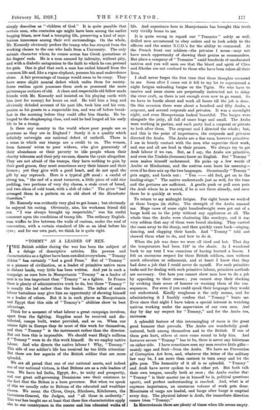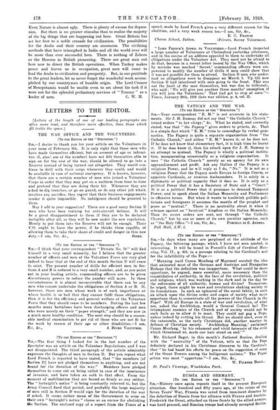"TOMMY" AS A LEADER OF MEN.
THE British soldier during the war has been the subject of a deluge of descriptive articles. His powers and characteristics as a fighter have been extolled everywhere. " Tommy Atkins " has. certainly " had a good Press." But of " Tommy " as a pioneer of civilization, as. a leader of primitive native races in distant lands, very little has been written. And yet in such a campaign as. ours here in Mesopotamia "Tommy " as a leader of men is no less important than " Tommy " as a fighter. In France there is plenty of administrative work to do, but there " Tommy " is usually. the led rather than the leader. The influx of native labour battalions may give him an opportunity of showing himself as a leader of others. But it is in such places as Mesopotamia and Egypt that this side of " Tommy's " abilities show to best advantage.
Think for a moment of what labour a great campaign involves, apart from the fighting: Supplies must be received and dis- tributed, camps built, water provided, and so- on. When our armies fight. in Europe-they do most. of this work for themselves, and then " Tommy " is. the instrument rather than the director. But out here this is impossible. We should want Hirig's millions if " Tommy " were to do this work himself. So we employ native labour. And. who directs- the native. labour f Why, "Tommy." This side of our soldier's. life has received far too little attention• But there are few aspects of the British soldier that are more splendid.
We are. all proud that one of our national assets, and indeed one of our national virtues, is that Biitons are as a- rule leaders- of men- We have led India, Egypt, &a., to unity and prosperity, and our great self-governing Dominions owe their existence to the fact that the Briton is a born governor. But when we speak of this we usually refer to Britons of the educated and wealthier classes. We mean the Olives, Greys, Rhodese,s,, Kitcheners, the GovernoneGeneral, the Judges, and " all. those in, authority." This war-has taught me at least that these fine characteristics apply 4180 to our countrymen, in. the poorer and less educated walks of
life. And experience here in Mesopotamia has brought this truth very vividly home- to me.
It is quite wrong to regard our " Tommies " solely as well. drilled men accustomed to obey orders and to look solely to the officers and the senior N.C.O.'s for the ability to command. At the French front our soldiers—the privates I mean—may not have much opportunity of showing their genius as commanders. But place a company of " Tommiee " amid hundreds of uneducated natives and you will soon see that the blood and spirit of Clive and Rhodes are not confined to those who have been rulers all their lives.
I shall never forget the first time that these thoughts occurred to me. Soon after I came out it fell to my lot to superintend a night fatigue unloading barges on the Tigris. We who have to receive and issue stores are perpetually instructed not to delay the river craft, as there is not enough even now to go round. So we have to bustle about and work all hours till the job is done. On this occasion there were about a hundred and fifty Arabs, a sergeant,. and several corporals and privates. It was a moonlight night, and even Mesopotamia looked beautiful. The barges were alongside the jetty, all full of oases huge and small. The Arabs were working in. parties, and each party had a corporal or private to look after them. The sergeant and I directed the whole ; but, and this is the point of importance, the corporals and privates directed the Arabs. The Arabs are a fine race, however primitive. I am in hourly contact with the men who supervise their work, and one and all am loud in their praises. We always try to get Arab labour if we can. But,, as I say, the Arabs are primitive, and even the Tindalo (foremen) know no English. But " Tommy " soon makes himself understood. He picks up a few words of Arabic or Hindustani, and the natives soon learn his meaning— even if he does mix up the two languages. Occasionally " Tommy " gets angry, and bawls out : " You — old fool, get on to the landing-stage." The native understands just as well, for the tone and the gestures are sufficient. A gentle push or pull soon puts the Arab where he is wanted, if he is not there already, and once there he is quickly at work.
To return to my midnight fatigue. For eight hours we worked at these barges (in shifts). The strength of the Arabs amazed me. Huge cases of some eight hundredweight were got out of a barge hold on to the jetty without any appliances at all. The whole time the Arabs were chattering like monkeys, and it was very seldom that any of them were found slacking. They carried the cases away to the dump, and then quickly came back—singing, dancing, and clapping their hands. And " Tommy " told and showed them what to do, and how to do it.
When the job was done we were all tired and hot. That day the temperature had been 118° in the shade. As I wandered back to my tent I was conscious of having learned a lesson. 1 felt an enormous respect for these British soldiers, men without much education or refinement, and at heart I knew that they had done a job that I could never do myself. For such primitive tasks and for dealing with such primitive labour, primitive methods are necessary. Out here you cannot show men how to do a job by appealing to their reasona you cannot stop their slacking by evoking their sense of honour or warning them of the con- sequences. For even if you could speak their language they would not understand. Kindly roughness is the only means, and for administering it I frankly confess that " Tommy " beats me. Ever since that night I have taken a special interest in watching natives. working under the supervision of our own men. And day by day my respect for " Tommy," and for the Arabs too, increases.
A splendid feature of this intermingling of races is the great good humour that prevails. The Arabs are wonderfully good- natured, both among themselves and to the British. If one of them gets hurt,, others at once come round to help him. And however severe " Tommy " has to be, there is never any bitterness on either side. I have sometimes seen my men receive little gifts— mainly eggs and fruit—from the Arabs. We have no Prevention of Corruption Act here, and, whatever the letter of the military law may be, I am more than content to turn away and let the
gifts pass. The humanity of it all is so splendid. " Tommy " and Arab have never spoken to each other yet. But both talk their own tongue, usually both at once ; the Arabs realize that " Tommy " is their master (as in himself he is, political questions apart),, and perfect understanding is reached. And, what is of supreme importance, an enormous volume of work gets done. Mountain& of cargo are loaded, and barge after barge is emptied every • day. The physical labour is Arab, the immediate direction comes from " Tommy," In. Mesopotamia there are plenty of times when life seems empty. Even Nature is almost ugly. There is plenty of excuse for depres- sion. But there is no greater stimulus than to realize the majesty of the big things that are happening out here. Great Britain has set her foot to a noble crusade for civilization. The possibilities for the Arabs and their country are enormous. The civilizing methods that have triumphed in. India and all the world over will be more than ever successful here. There is nothing of Zabem or the Hereros in British pioneering. There are great men out here now to direct the British operations. When Turkey makes peace and leaves us in occupation, great men will come to lead the Arabs to civilization and prosperity. But, in our gratitude to the great leaders, let us never forget the wonderful work accom- plished by our countrymen of humble origin. The Lord Cromer of Mesopotamia would be unable even to set about his task if it were not for the splendid preliminary services of " Tommy " as a



























 Previous page
Previous page